Mass
Saturday
5:30 pm (only from Memorial Day Weekend through October)
Sunday
9:00 am
Monday
9:30 am (Vatican II Mass in Latin)
Tuesday
7:00 pm (Spanish)
Wednesday
9:30 am (Adoration starting at 8:30 am)
Sunday
9:00 AM
Monday
9:30 am (Latin)
Tuesday
7:00 pm (Spanish)
Wednesday
9:30 am (Adoration starting at 8:30 am)
Confession
The Sacrament of Reconciliation is offered 15 minutes before daily masses and 30 minutes before Sunday Mass. Additionally, you may click below to schedule an appointment.
Sunday
After Mass upon Request
Tuesday
9:10 a.m. – 9:25 a.m.
Thursday
9:00 a.m. – 9:15 a.m.
Saturday
3:30 p.m. – 3:55 p.m. (during the season)
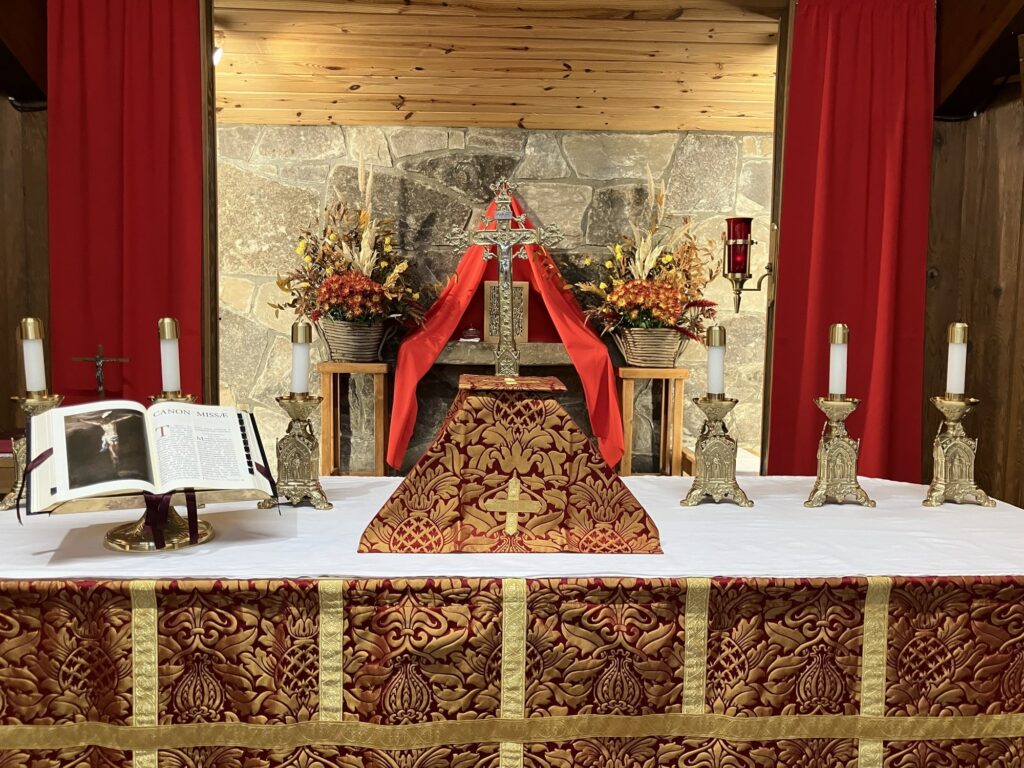
Other Devotions
Adoration
Wednesday
8:30 am – 9:30 am
Morning Prayer/Lauds
Monday and Wednesday
9:15 am
Rosary
Saturday
5:10 pm (during the season)
Sunday
8:40 am
Mass Intentions
To schedule a Mass intention call the church office at 828-743-5717.
The Sacrament of Baptism
Baptism is the gate to the other sacraments. It ushers us into the divine life, cleanses us from sin, and initiates us as members of the christian community. Baptism has six primary effects. In addition to the removal of guilt for both original sin and personal sin, baptism also removes the remission of all punishment that we owe because of sin, both temporal (in this world and in purgatory) and eternal (the punishment that we would suffer in hell). Baptism also provides an infusion of grace in the form of sanctifying grace (i.e. the life of God within us) and provides the seven gifts of the Holy Spirit and the three theological virtues of faith, hope, and charity. Additionally, baptism allows us to become a part of the Church which is the Mystical Body of Christ on earth and enables participation in the sacraments, the priesthood of all believers, and the growth in grace. Baptism seals the Christian with an indelible spiritual mark (the “character of baptism”) which sin cannot erase.
Baptism Requirements
If you would like to have your child baptized, please review the following guidelines. Feel free to contact the office if you have any questions.
To Become a Godparent
If you would like to be a godparent, please read the Godparent Guidelines and the form applicable to you:
The following may also be helpful:
“Amen, amen I say to thee, unless a man be born again of water and the Holy Spirit, he cannot enter into the kingdom of God.”
John 3:5
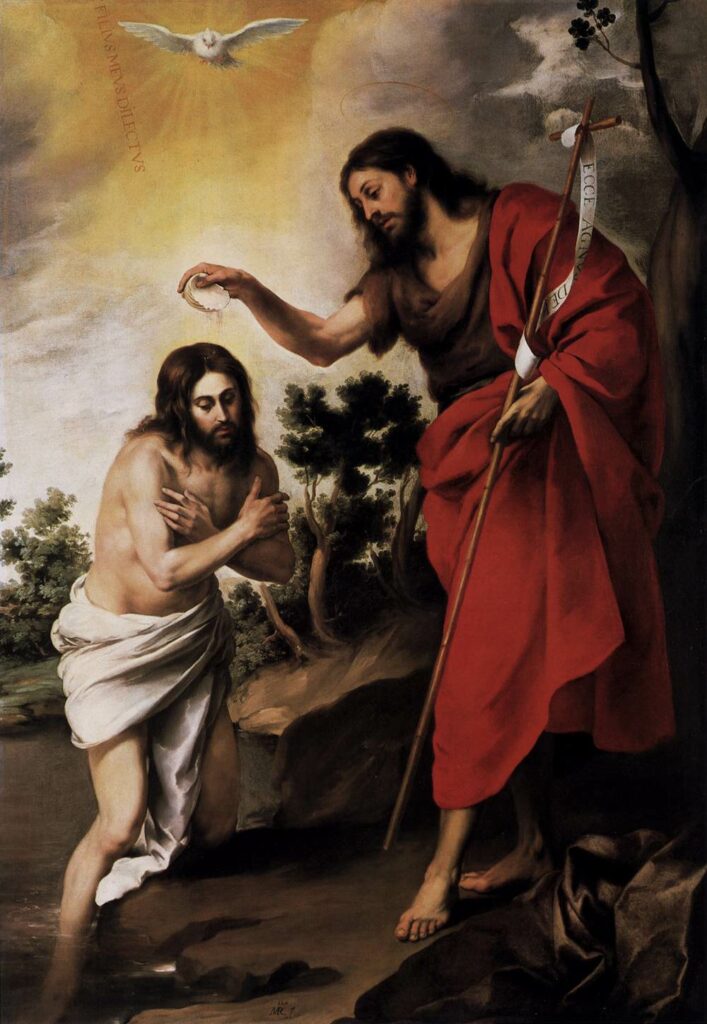
The Most Holy Eucharist
The celebration of the Eucharist is at the heart of the life of the Church, and it’s the source and summit of our Catholic Faith. It is called “Eucharist” because it is an act of thanksgiving to God. Receiving Holy Communion worthily brings us graces that affect us both spiritually and physically. Holy Communion also gives us spiritual joy in the service of Christ, in defending His cause, in performing the duties of our state of life, and in making the sacrifices required of us in imitating the life of our Savior. On Christ’s own promise, Holy Communion is a pledge of heavenly glory, and of our bodily resurrection from the dead (John 6:55).
First Confession & First Holy Communion Requirements
As children reach the age of reason, generally around age seven, the Latin Rite of the Catholic Church extends to them the invitation to celebrate the Sacrament of Holy Communion. The initiation into the Christian community that took place at baptism is further extended by inviting children to enter fully into the heart of Christian faith through participation in the Eucharist. Children entering the second grade are able to begin preparation to receive their First Holy Communion.
If you would like to have your child begin preparation for first confession and first Holy Communion, please review the guidelines and contact the office. Feel free to contact the office if you have any questions.
“Amen, amen I say unto you: Unless you eat the flesh of the Son of man, and drink his blood, you shall not have life in you.”
John 6:54
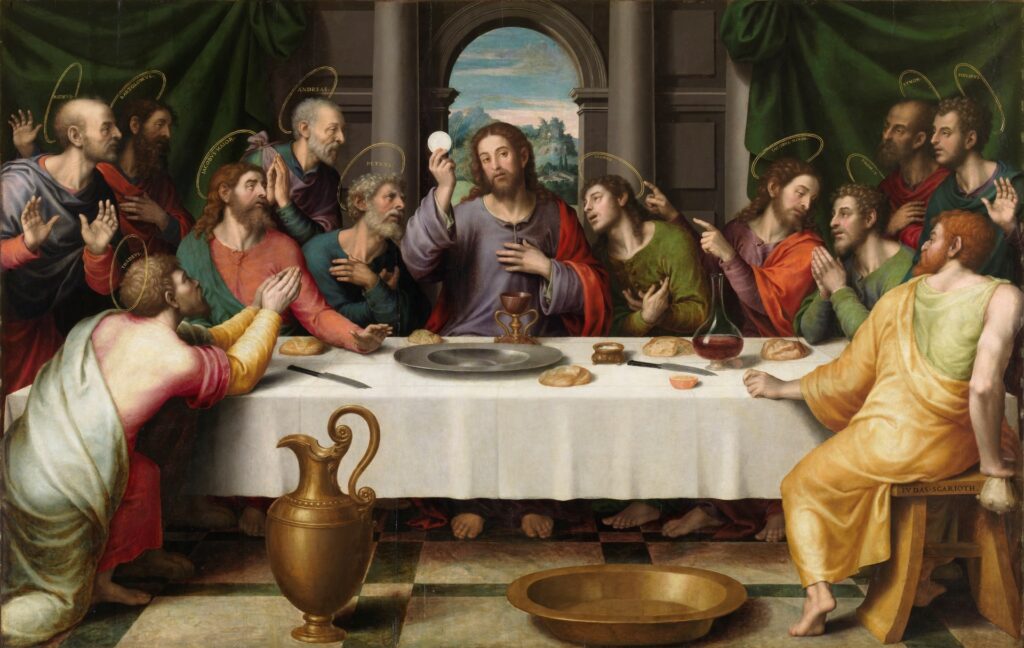
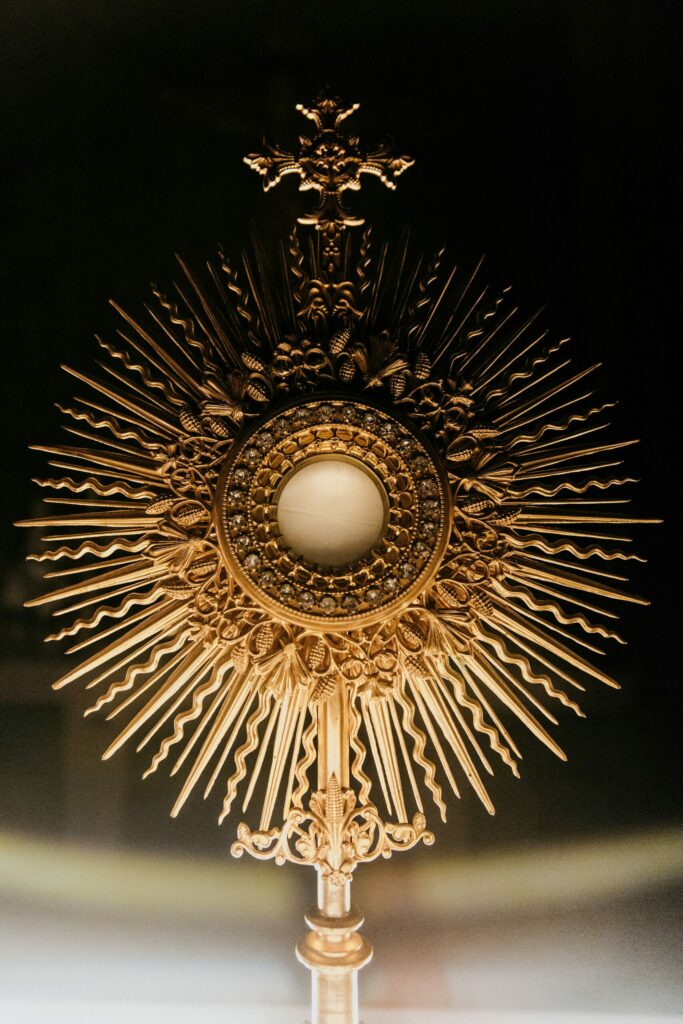
The Sacrament of Confirmation
Confirmation is one of the sacraments of initiation, along with baptism and Eucharist. While baptism is the sacrament of rebirth to a new and supernatural life, confirmation is the sacrament of maturity and coming of age. It is conferred by the anointing of chrism oil and the laying on of hands by the bishop or priest.
The sacrament of confirmation draws us into a greater awareness of the Holy Spirit, which we received at Baptism. Through this sacrament, we confirm the presence of the baptismal gifts we have already received; we are sealed with the undeserved and unearned gift of the Holy Spirit. By a signing with the gift of the Spirit, confirmation enriches the baptized with the Holy Spirit, binding them more perfectly to the Church, and strengthening them in their witness to Christ by word and deed and in their work to bring to its fullness the Body of Christ. Sealing with the gift of the Spirit at confirmation strengthens us for ongoing service in the Body of Christ in the Church and in the world. It prepares us to be active participants in the Church’s mission and to bear witness to the christian faith in words accompanied by deeds. Finally, the Spirit sends us as workers in the vineyard and instruments of the Holy Spirit in renewing the earth and promoting God’s Kingdom for the salvation of the world. Thus, confirmation is not only an anointing, but also a commissioning to live out our faith in the world. We are already called to mission by virtue of our baptism, but at Confirmation we are endowed with gifts of the Spirit (like the Apostles in Acts 2) to be ever greater witnesses to the Gospel in the world.
Effects of Confirmation
The Sacrament of Confirmation confers special graces of the Holy Spirit upon the person being confirmed, just as such graces were granted to the Apostles on Pentecost. Like Baptism, therefore, it can only be performed once, and Confirmation increases and deepens all of the graces granted at Baptism. The Catechism of the Catholic Church lists five effects of Confirmation:
- confirmation roots us more deeply as sons and daughters of God and unites us more firmly to Christ;
- confirmation increases the gifts of the Holy Spirit in us;
- confirmation renders our bond with the Church more perfect;
- confirmation gives us a special strength of the Holy Spirit to spread and defend the Faith by word and action as true witnesses of Christ, to confess the name of Christ boldly, and never to be ashamed of the Cross.
Preparing for Confirmation
Catechesis for confirmation should strive to awaken a sense of belonging to the Church of Jesus Christ, the universal Church as well as the parish community. A candidate for confirmation who has attained the age of reason must believe in and profess the Faith, be in the state of grace, have the intention of receiving the sacrament and be prepared to assume the role of disciple and witness to Christ, both within the ecclesial community and in temporal affairs. Candidates for confirmation fittingly seek the spiritual help of a sponsor.
To Have a Child Confirmed
If you would like to have your child confirmed, please review the following FAQs and contact the parish office. Also, feel free to contact the office if you have any questions.
To Become a Sponsor
If you would like to be a sponsor for someone receiving confirmation, please read the Confirmation Sponsor Guidelines.
The following may also be helpful:
"You did not choose me but I chose you."
John 15:16
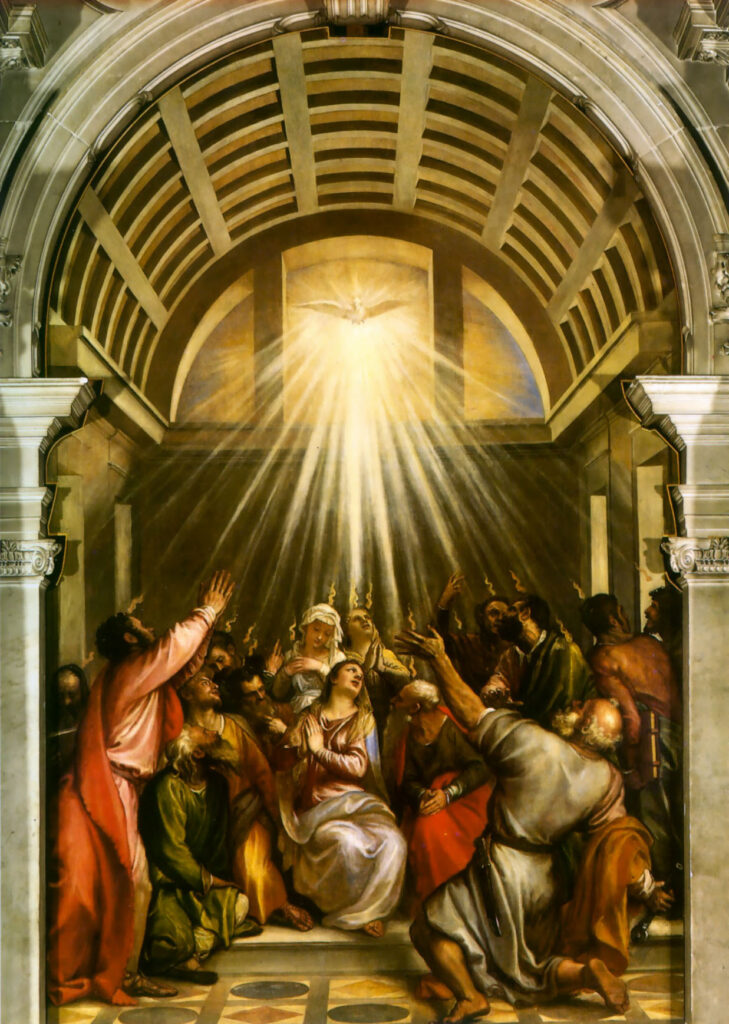
Sacrament of Marriage
Marriage is one of the seven sacraments and should be entered into with great reverence, discernment, and preparation. For this reason, we ask that couples wishing to get married at St. Jude Catholic Church be actively participating in the life of the Catholic Church prior to the wedding.
Matrimony is a sacrament that consecrates for a particular mission in building up the Church. It is seen as a sign of the love between Christ and the Church, which is established between spouses in a permanent and exclusive bond, sealed by God. The sacrament gives couples the grace they need to attain holiness in their married life and for responsible acceptance and upbringing of their children. Since marriage establishes the couple in a public state of life in the Church, it is fitting that its celebration be public, in the framework of a liturgical celebration, before the priest (or a witness authorized by the Church), the witnesses, and the assembly of the faithful.
Marriage Requirements
To be married at St. Jude Catholic Church, please review the following guidelines before contacting the parish office.
“For this cause shall a man leave father and mother, and shall cleave to his wife, and they two shall be in one flesh…What therefore God hath joined together, let no man put asunder.”
Matthew 19:5-6
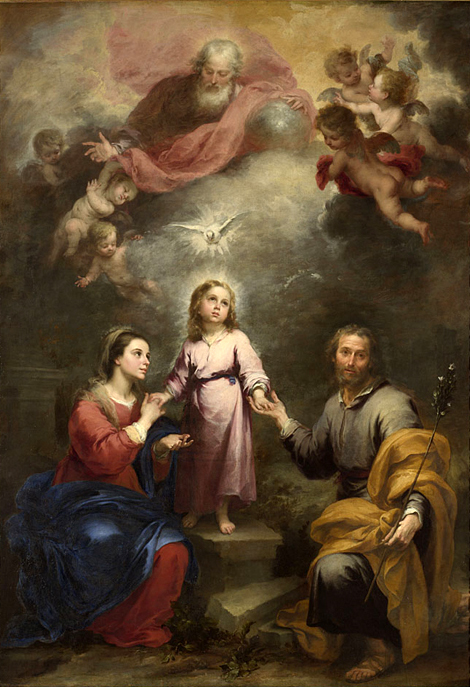
Anointing of the Sick - Extreme Unction
If there is a SACRAMENTAL EMERGENCY (a proximate danger of death), please call (828) 634-1377. If no one answers, IMMEDIATELY call again. If no one answers after several attempts and the office is open, call the office.
If death is not imminent, contact the office to schedule the sacrament.
An Explanation of Anointing
To support and strengthen those who are sick, the Church gathers to pray and anoint those who are ailing with the healing oil of the sick. This oil symbolizes the presence of God at a time of great physical and emotional need and assures the recipient of God’s love and healing presence to give strength and hope. According to the Letter of James 5:14-16, the people are to bring the sick to the priest so that they can be anointed and prayer can be offered on their behalf. Jesus showed great care for those who were sick and was concerned with their bodily and spiritual well-being. Because of this, the Church has developed a ritual to pray with and for those who are ill. It is our belief that through this sacrament, Christ strengthens those who are ill so that they might be at peace and have the courage to fight their illness
The Anointing of the Sick conveys several graces and imparts gifts of strengthening in the Holy Spirit against anxiety, discouragement, and temptation, and conveys peace and fortitude. Anointing with sacred oil is a sign of blessing by the Holy Spirit of the one who is sick. Oil of the Sick, which receives a different blessing from the Chrism oil used during Baptism, Confirmation, and Holy Orders, recalls the community’s sharing of the Holy Spirit and the sick person’s connection to the entire Body of Christ and Communion of Saints.
Who may Receive the Anointing?
A baptized Catholic over the age of reason in a proximate danger of death. Since anointing has the spiritual effect of forgiving actual sin, and as children under the age of reason are unable to commit sin, the sacrament is not given to children under the age of reason. Other prayers and blessings are offered for a terminally sick child.
Does a person have to be actively dying to receive this sacrament? No. The catechism says, “The Anointing of the Sick is not a sacrament for those only who are at the point of death. Hence, as soon as anyone of the faithful begins to be in danger of death from sickness or old age, the fitting time for him to receive this sacrament has certainly already arrived” (CCC 1514). The traditional phrase is: those in a proximate danger of death. The sacrament may be repeated if the sick person recovers after the anointing but becomes ill once again, or if, during the same illness, the person’s condition becomes more serious. A person should be anointed before surgery when the illness or surgery itself constitutes a proximate danger of death.
The Effects of Anointing
Through anointing, the sick are reminded that Christ and the Church are in communion with their suffering. The Holy Spirit shares the blessings of health, trust in God, and strength against temptation. The special grace of the sacrament of the Anointing of the Sick has as its effects:
- the uniting of the sick person to the passion of Christ, for his own good and that of the whole Church
- the strengthening, peace, and courage to endure in a christian manner the sufferings of illness or old age
- the forgiveness of sins, if the sick person was not able to obtain it through the sacrament of penance (confession)
- the restoration of health, if it is conducive to the salvation of his soul
the preparation for passing over to eternal life.
How often can one be Anointed?
The sacrament may be repeated if the sick person, who was in a proximate danger of death, recovers after the anointing but becomes ill once again, or if, during the same illness, the person’s condition becomes more serious. A person can be anointed again before surgery if the illness worsens or if surgery itself is dangerous enough to constitute a proximate danger of death.
Last Rites
There are four elements of last rites:
- Confession for those who can still make a confession. If the person is unconscious, absolution is still given.
- Anointing of the Sick.
- Viaticum (i.e. Holy Communion).
- Apostolic Pardon (i.e. a plenary indulgence).
“Is any man sick among you? Let him bring in the priests of the church, and let them pray over him, anointing him with oil…and if he be in sins, they shall be forgiven him.”
James 5:14-15
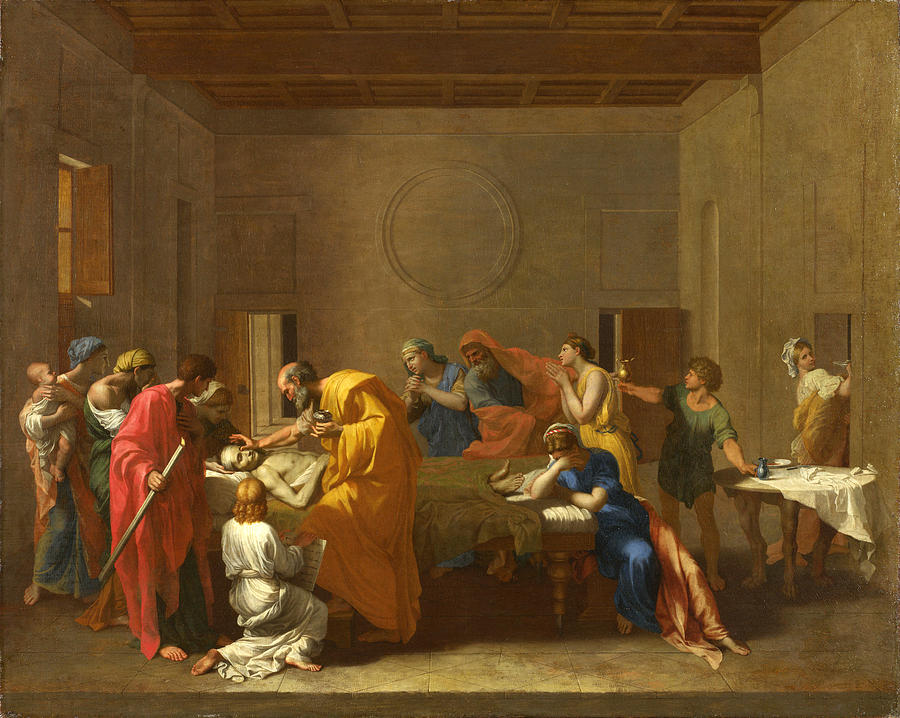
Funeral Information
The death of one of our brothers or sisters in Christ is a significant event for us as members of the Church. It is a time when we, who loved the deceased person, mourn for our loss. It is a time when we as the Church celebrate God’s gift of life and mark, with special rites and gatherings, the return of that life to our loving God. It is a time when the Church earnestly seeks to minister not only to the deceased but the living as well.
To Schedule a Funeral
To schedule a funeral, we encourage you first to contact a funeral home who can assist you in this difficult process; however, you are welcome to contact the office.
The following may also be helpful:

